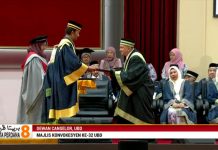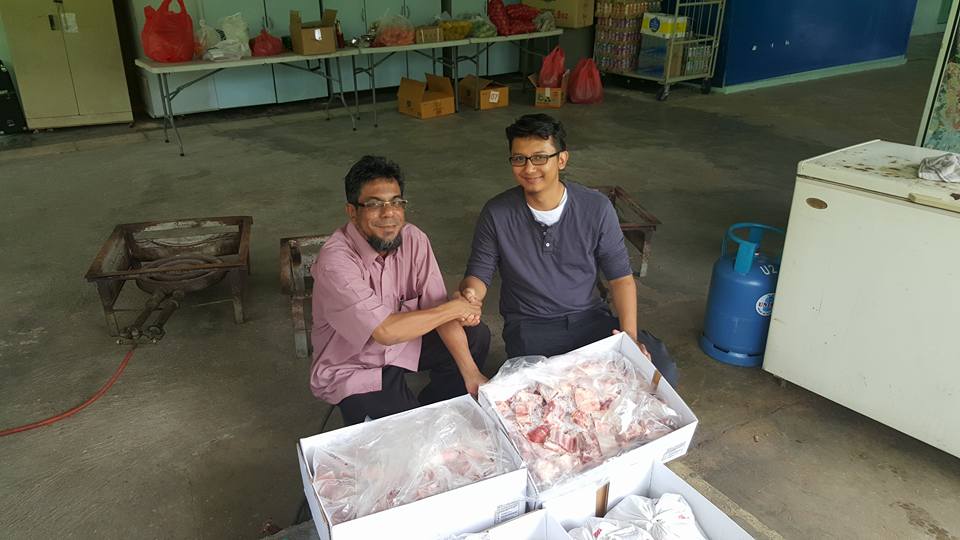 Written by: Mohamad Nizar Bin Zainal
Written by: Mohamad Nizar Bin Zainal
Shaykh Yahya begins by describing these gatherings as a means of having spiritual breezes or spiritual perfusions for the heart. And we need to expose ourselves to these breezes, by constantly praising the Most Blessed of All Creation, the Prophet (s). The more that we praise him (s), the more that we mention him (s), the more that we will tie everything back in our lives back to him (s). The greatest scholars, those who have reached the pinnacle of wilayah (sainthood) – they always relate everything back to the Prophet (s). Everything that they mention, they mention Rasulullah (s) everything that happens, they relate back to Rasulullah (s), they constantly talk about how they feel for Rasulullah (s).
Shaykh carries on to expound on the given topic. He says that within our religion, therein lies the deepest meanings of “mahabbah” or love. This love is not only love between creation, but also the love of Allah and His creations. This is evident in the hadith qudsi “I (Allah) am a hidden treasure, and I love to be known. And I created the creations that they may come to know me.” Everything came into existence by the Mercy and Love of Allah.
Shaykh gave the example of a Ba’Alwie scholar who had internalised the level of the meaning of the kalimah tauhid “La ilaha illa Allah” as “La ma’bud illa Allah” – none is worthy of being served other than Allah – and he also internalised it as none is worthy of being truly loved other than Allah. Such was the reality of his belief that when he used to recite the Quran, his saliva would turn into honey, and this happened in the month of Ramadhan when the blessed scholar was so devoted to his readings that Allah gave him this karamah as a reward for his love. Such was his devotion that he could continue reading a single ayat “Inna ladzina aamanu wa ‘amilus salihati sayaj’alu lahum Ar-Rahmanu wudda” (Verily those who believe and work righteous deeds the Beneficent (God) will appoint love for them, Maryam 19:96) in his night prayer. His prayer would last not 1 or 2 hours, but up to five hours, and he would repeat the word “wudda” (love) over and over again. And this he was able to do because Allah renewed the realities behind that word for the Habib, and each time he recited the word, he would experience something different from when he recited it before.
This is congruent with the traditions of some scholars from Persia, that they would call the Quran the Book of Love, the Book whereby we can draw near to Allah on the path of love. And it is also congruent with the reality that the foundation of creation is love, and that ultimately, the greatest thing that someone can possibly achieve in this world is to attain the love of Allah. This is also proven by another hadith qudsi “Those who want to draw near to me (Allah) would not draw near to me with anything greater than performing the obligatory acts that I have prescribed for him, and my servant will continue to draw near to me through supererogatory acts, until I love him.” The uttermost outcome of the performing any acts is to attain the love of Allah.
There is a difference in a muhib (one who loves) and a mahbub (one who is loved). It is good to love someone who is loved by Allah, but it is even greater to be loved by someone who is loved by Allah, and even greater still to become a beloved of Allah. This is the greatest honour someone could ever attain.
This is why Allah creates many opportunities for us to be mazkur (remembered, mentioned) in His Presence. The du’a we read when we partake of food “The righteous have eaten your food, may He send to you His Righteous Angels, and may Allah mention you with those in His Presence.” Who are in Allah’s presence? These are the Arwahut Taahir – the Purified Souls. These are the souls of the Prophets, the Cherubim.
The Prophet also said “No one person stays in a house of Allah, reciting and learning the Quran among themselves, except that tranquillity will descend upon them, and they will be encircled by angels, covered with mercy, and they will be mentioned by Allah to those in His Presence.” Also, another narration, “Whoever mentions Me (Allah) in himself, I (Allah) will mention him in My Self. Whoever mentions Me (Allah) in a group, I (Allah) will mention him in a group that is better than his group.” This is something that we should strive to attain. That despite all our worldly pursuits, we need to realise what is truly worth seeking and striving for. And that at the end of it all, we need to see that ultimately, we should be seeking to be remembered by our Lord, and to become those selected by Him.
In another hadith qudsi, when Allah comes to love someone, He will call Jibril, and say “Oh Jibril, I love so-and-so, so love him.” Jibril will then announce it to the rest of creation, until the heavens and earths know that Allah loves so-and-so, and they will love him too.
For some people, Allah will send tribulations to them if they forget Allah for a moment. If the slightest sense of arrogance (‘ujub) enters their hearts, Allah will send them tribulations. If anything distracts them from Allah, they will be tested. These are actually ways that Allah protects these individuals. Thence, the greatest path that we can seek is the path of the Love of Allah.
It is said that all of the stations of certainty (maqaamat al-yaqin) lead up to mahabbah (love). Anyone who seeks the path of love of Allah, will naturally love who Allah Loves, and there is no one that Allah Loves more than the Prophet (s). And therefore none is more worthy of our love than Rasulullah (s).
This is why love is truly essential in our religion. We need to tune ourselves to this love, to the love of the Prophet (s). Gatherings such as these are important, and are one of the ways that we can tune our hearts to receive the signals of the Prophet’s love. Not only should we enliven his Sunnah, but we should also be praising him and remembering him, and remembering the status of his Ummah, and giving victory to his Deen – these are the various ways to attain the love of the Prophet (s).
We need to attach ourselves to the Prophet (s), to have a connection to him – once we attach ourselves, we will start to see the realities of what he (s) said, he (s) will come to us in our dreams, he will come to us in other ways.
Shaykh Yahya then recollected about the Companions, that when Rasulullah (s) asked them what they wanted for, that they could ask for anything, their only desire was to be with Rasulullah (s). They could have asked for martyrdom, they could have asked for Jannah, they could have asked for anything – but they asked to be close (murafaqah) to the Prophet (s).
It is also said that when someone goes to the Haudh of the Prophet (s) in the Hereafter, and in that instant that they perceive the Prophet (s), that if that had been the only reward, that one moment would be more than sufficient reward for all the things that they have done in their entire lives. Masya Allah!!
Shaykh then ended by reminding us that there is no reason behind our getting together in the majlis, except “La ilaha illa Allah” and that Islam will not fall no matter what others try to do to bring it down, because of the Prophetic breezes that flow through in the world, to bring glad tidings, again and again and again. One of his teachers had a vision of the oppression being carried by the Western world, and when the oppression reached its peak, the Prophetic breeze came, and converted a large portion of the people of those nations. That despite all that we do, the only reality that will bring people into Islam is through the light and blessings of the Prophet (s).
 |
Loving the Prophet – Effective Habits of Muslims
|

 19 April 2009, 8pm
19 April 2009, 8pm







I absolutely love this sieers at Washington Post. Most of the commentators have gived a nuanced version of the complex issue. I especially liked the one by Mohja Kahf which surpasses others in terms of its fresh perspective and prose quality. The one by Mohsin Hamid was also good as he tries to grapple the issues many first-generation (and even second-generation) immigrants face in USA. Mufti Fadlallah tries well to explain the concept of jihad but his comments on apostasy don’t cut much ice with me.Overall, a welcome dialogue.